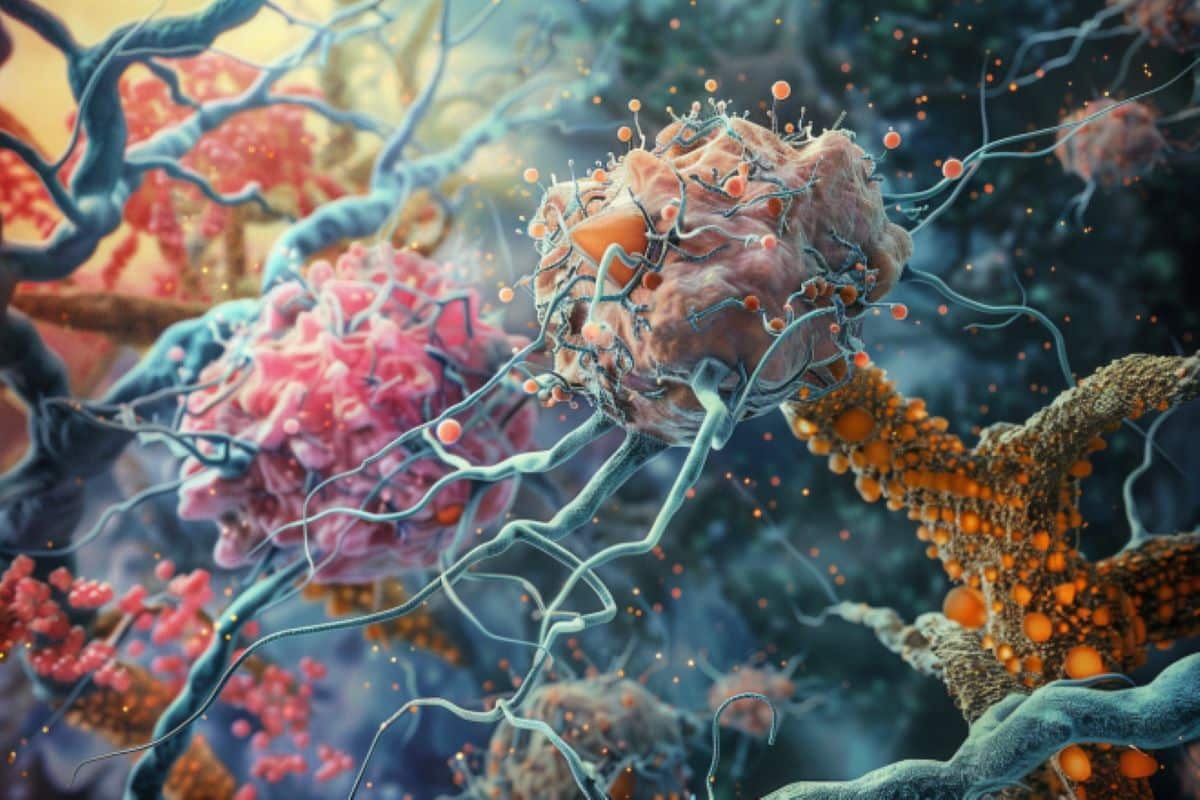Summary: Researchers identified a key signaling pathway, PI3K-beta, responsible for chemotherapy resistance in glioblastoma. Blocking this pathway makes tumor cells more sensitive to temozolomide, a standard chemotherapy drug. This discovery offers a potential new approach to treating glioblastoma, a deadly brain cancer, by overcoming drug resistance and improving patient outcomes.
Key Facts:
- PI3K-beta signaling pathway is crucial for glioblastoma cell survival during chemotherapy.
- Blocking PI3K-beta increases tumor cell sensitivity to temozolomide treatment.
- This discovery offers a potential new approach to treating glioblastoma by overcoming drug resistance.
Source: Virginia Tech
For many patients with a deadly type of brain cancer called glioblastoma, chemotherapy resistance is a big problem.
Current standard treatments, including surgery, radiation, and chemotherapy using the drug temozolomide, have limited effectiveness and have not significantly changed in the past five decades. Although temozolomide can initially slow tumor progression in some patients, typically the tumor cells rapidly become resistant to the drug.
But now, Virginia Tech researchers with the Fralin Biomedical Research Institute at VTC may have moved a step closer to a solution.
Working with glioblastoma cell cultures, including glioblastoma stem cells derived from patient specimens, and laboratory mouse models harboring human cancer cells, scientists have pinpointed an effective molecular signaling pathway that is thought to be crucial for cancer cell survival during temozolomide treatment.
The findings are now online in iScience, an open-access journal of Cell Publishing.
“In the past 50 years, treatment options for glioblastoma have remained largely unchanged, relying on surgery, radiation, and temozolomide,” said Zhi Sheng, senior author of the study and assistant professor at the Fralin Biomedical Research Institute.
“However, temozolomide’s effectiveness is limited, and resistance to the chemotherapy inevitably develops in patients. Since it’s the only currently available approved chemotherapy that can effectively reach the brain, finding ways to restore its effectiveness is crucial in addressing the treatment failure in glioblastoma.”
Researchers examined the Phosphoinositide 3 Kinase (PI3K) molecular signaling pathway, which is like a communication system inside cells. It tells cells how to grow, survive, and divide. When this pathway is activated, it can promote cancer growth, so scientists and clinicians generally thought blocking it could be a way to treat cancer.
Their results have not been successful.
In the new research, Fralin Biomedical Research Institute scientists found that in some brain cancer patients who didn’t respond to treatment, levels were high of a specific form of the signaling protein called PI3K-beta that helps regulate cellular processes.
When they blocked just PI3K-beta in cell cultures and mouse models harboring cancer cells, the tumor cells became more sensitive to temozolomide treatment. In addition, using a drug that blocks PI3K-beta along with the usual treatment slowed down the cancer cells’ growth.
Researchers are uncertain why PI3K, in its various forms, are very similar in structure yet do different things in the body.
“The reason previous treatments targeting the PI3K pathway failed is because they didn’t distinguish between PI3K-beta and its related proteins,” Sheng said. “This research shows that PI3K-beta is specific to glioblastoma, making it the crucial target for effective treatment.”
Going forward, overcoming the blood-brain barrier remains a hurdle for delivering P13K-beta inhibitors into the brain, which will be crucial for translating the findings into the clinic to help patients.
“We will resolve these issues in our future studies,” Sheng said.
Co-first authors of the study are Kevin Pridham, a former postdoctoral associate at the Fralin Biomedical Research Institute, and Kasen Hutchings and Patrick Beck, two former medical students at the Virginia Tech Carilion School of Medicine who are pursuing their medical careers in radiology in Las Vegas and pediatrics in Philadelphia, respectively.
Cell specimens were provided by Carilion Clinic. Study results are in part based on data generated by The Cancer Genome Atlas Research Network, the Dependency Map, the Genotype-Tissue Expression, or the Chinese Glioma Genome Atlas.
Funding: The research was supported by the National Institutes of Health.
About this brain cancer research news
Author: John Pastor
Source: Virginia Tech
Contact: John Pastor – Virginia Tech
Image: The image is credited to Neuroscience News
Original Research: Open access.
“Selective regulation of chemosensitivity in glioblastoma by phosphatidylinositol 3-kinase beta” by Zhi Sheng et al. iScience
Abstract
Selective regulation of chemosensitivity in glioblastoma by phosphatidylinositol 3-kinase beta
Highlights
- Divergent roles of PI3K kinases in glioblastoma’s chemoresistance
- PI3Kβ outcompetes PI3Kα/δ/γ in chemoresistance
- PI3Kβ inhibitors are effective chemosensitizers
- PI3Kβ regulates drug sensitivity in glioblastoma stem cells
Summary
Resistance to chemotherapies such as temozolomide is a major hurdle to effectively treat therapy-resistant glioblastoma. This challenge arises from the activation of phosphatidylinositol 3-kinase (PI3K), which makes it an appealing therapeutic target.
However, non-selectively blocking PI3K kinases PI3Kα/β/δ/γ has yielded undesired clinical outcomes. It is, therefore, imperative to investigate individual kinases in glioblastoma’s chemosensitivity.
Here, we report that PI3K kinases were unequally expressed in glioblastoma, with levels of PI3Kβ being the highest.
Patients deficient of O6-methylguanine-DNA-methyltransferase (MGMT) and expressing elevated levels of PI3Kβ, defined as MGMT-deficient/PI3Kβ-high, were less responsive to temozolomide and experienced poor prognosis. Consistently, MGMT-deficient/PI3Kβ-high glioblastoma cells were resistant to temozolomide.
Perturbation of PI3Kβ, but not other kinases, sensitized MGMT-deficient/PI3Kβ-high glioblastoma cells or tumors to temozolomide. Moreover, PI3Kβ-selective inhibitors and temozolomide synergistically mitigated the growth of glioblastoma stem cells.
Our results have demonstrated an essential role of PI3Kβ in chemoresistance, making PI3Kβ-selective blockade an effective chemosensitizer for glioblastoma.

Dr. Sarah Adams is a scientist and science communicator who makes complex topics accessible to all. Her articles explore breakthroughs in various scientific disciplines, from space exploration to cutting-edge research.







